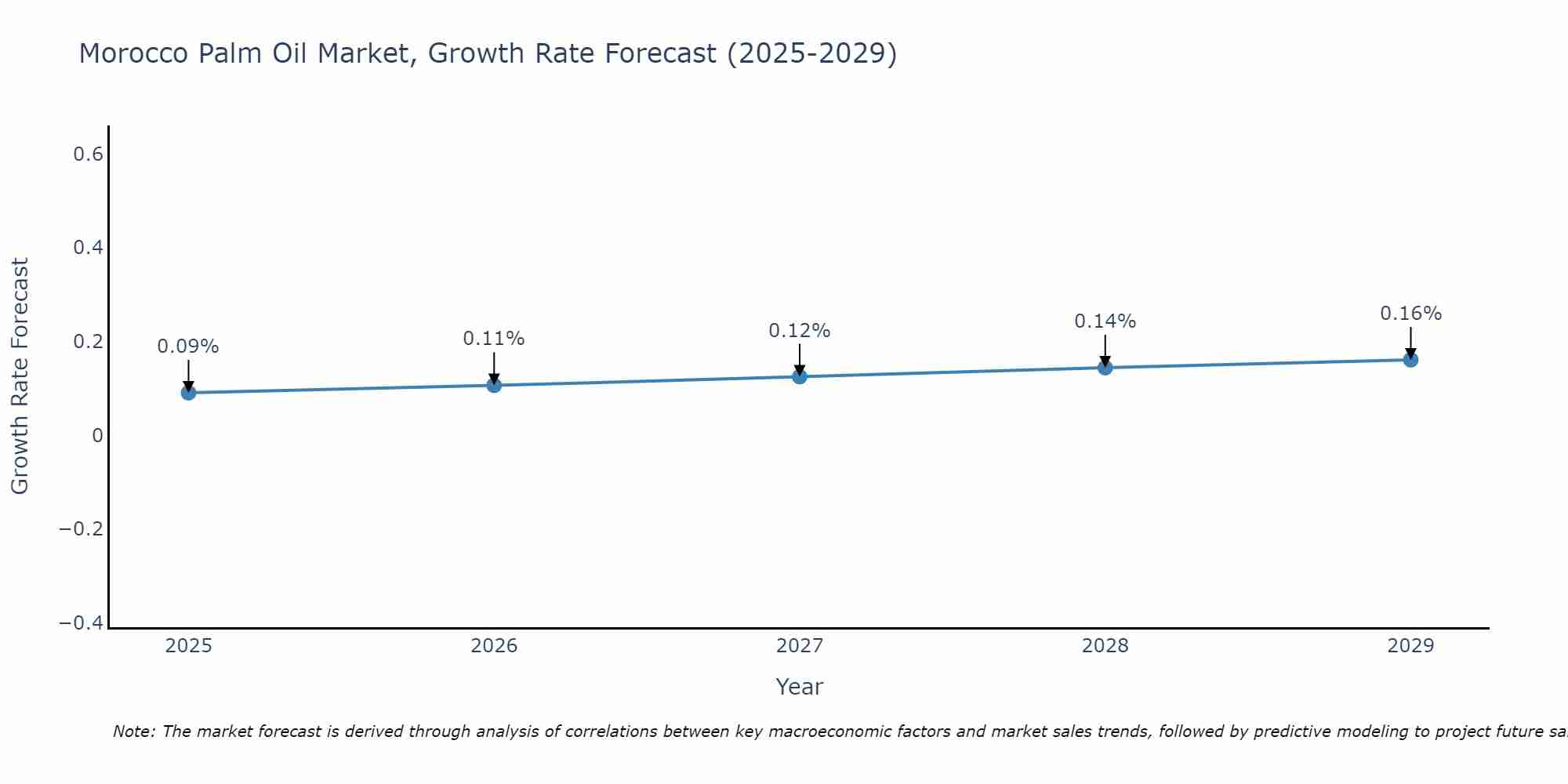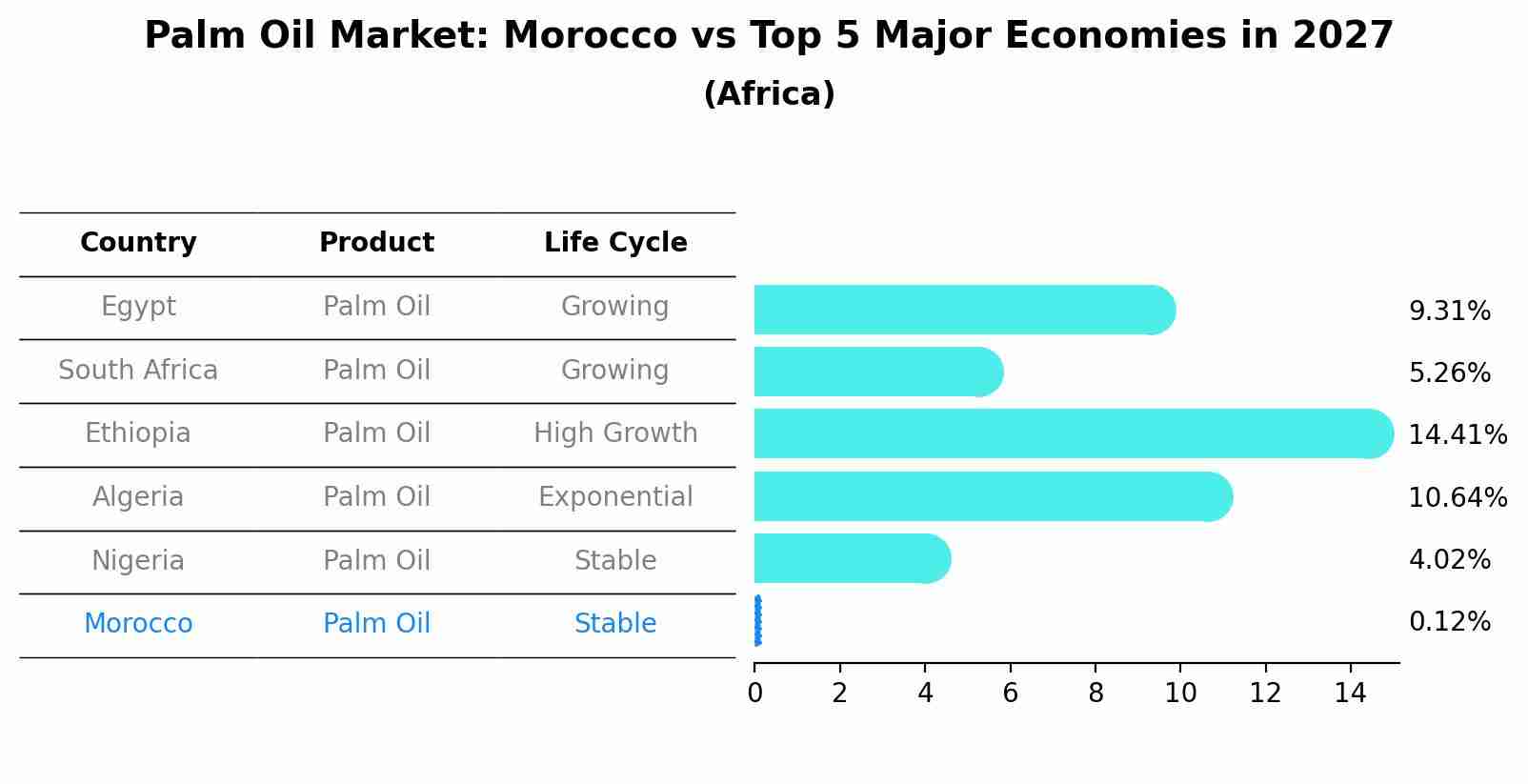Morocco Palm Oil Market Outlook | Growth, Revenue, COVID-19 IMPACT, Share, Size, Companies, Trends, Forecast, Value, Analysis & Industry
| Product Code: ETC383813 | Publication Date: Aug 2022 | Updated Date: Jul 2025 | Product Type: Market Research Report | |
| Publisher: 6Wresearch | Author: Sumit Sagar | No. of Pages: 75 | No. of Figures: 35 | No. of Tables: 20 |
Morocco Palm Oil Market Size Growth Rate
The Morocco Palm Oil Market is likely to experience consistent growth rate gains over the period 2025 to 2029. From 0.09% in 2025, the growth rate steadily ascends to 0.16% in 2029.

Palm Oil Market: Morocco vs Top 5 Major Economies in 2027 (Africa)
In the Africa region, the Palm Oil market in Morocco is projected to expand at a stable growth rate of 0.12% by 2027. The largest economy is Egypt, followed by South Africa, Ethiopia, Algeria and Nigeria.

Morocco Palm Oil Market Synopsis
The Morocco Palm Oil Market is characterized by a growing demand driven by its versatile applications in the food industry, including cooking oil, margarine, and various food products. The market is influenced by factors such as population growth, changing dietary habits, and increasing consumer awareness of the health benefits of palm oil. Local production of palm oil in Morocco is limited, leading to a high dependency on imports. The market is competitive with several key players operating in the region. However, there is also a rising trend towards sustainable sourcing practices and certification of palm oil products in response to environmental concerns. Overall, the Morocco Palm Oil Market presents opportunities for growth and innovation, particularly in promoting sustainable practices and meeting the evolving needs of consumers.
Morocco Palm Oil Market Trends
In the Morocco Palm Oil Market, there is a growing demand for sustainably sourced palm oil due to increasing consumer awareness of environmental and social issues. Consumers are becoming more conscious of the negative impacts of deforestation and wildlife habitat destruction associated with conventional palm oil production. As a result, there is a shift towards certified sustainable palm oil products in the market. Additionally, the food industry in Morocco is increasingly adopting palm oil alternatives such as palm oil-free products or using alternative oils like sunflower or olive oil. This trend is driven by health considerations and the desire to cater to the preferences of health-conscious consumers. Overall, the Morocco Palm Oil Market is witnessing a transition towards sustainable and healthier options in response to changing consumer preferences and concerns.
Morocco Palm Oil Market Challenges
In the Morocco Palm Oil Market, some of the key challenges include increasing competition from other vegetable oils, such as olive oil, which is more traditionally consumed in the region. Additionally, the country`s limited domestic production of palm oil leads to a heavy reliance on imports, making the market vulnerable to fluctuations in global prices and supply chain disruptions. Regulatory constraints and consumer preferences for locally produced and healthier alternatives further hinder the growth of palm oil in Morocco. Sustainability concerns related to deforestation, climate change, and ethical sourcing practices also pose challenges for palm oil producers looking to expand their market share in the country. Overall, navigating these challenges requires strategic planning, market research, and a deep understanding of the local market dynamics.
Morocco Palm Oil Market Investment Opportunities
The Morocco Palm Oil Market presents promising investment opportunities due to the country`s increasing demand for edible oils and growing focus on self-sufficiency in food production. Investors can explore opportunities in palm oil plantations, processing facilities, and distribution networks to meet the local demand and potentially export to neighboring regions. Additionally, there is a push towards sustainable palm oil production in Morocco, creating opportunities for investments in eco-friendly practices and certifications that cater to the growing consumer preference for sustainable products. However, investors should also consider factors such as regulatory frameworks, market competition, and potential environmental challenges when evaluating investment opportunities in the Morocco Palm Oil Market.
Jordan Agar Market Government Policies
The Moroccan government has implemented policies to regulate the palm oil market, aiming to protect local producers and consumers. In 2019, Morocco increased import duties on palm oil to support domestic production and reduce reliance on imports. Additionally, the government has imposed strict labeling requirements to ensure transparency and inform consumers about the origin and quality of palm oil products. These policies are in line with Morocco`s efforts to promote sustainable agriculture and protect the environment. Moving forward, the government is expected to continue monitoring the palm oil market closely and implement further measures to support local producers while meeting the country`s demand for palm oil.
Morocco Palm Oil Market Future Outlook
The future outlook for the Morocco Palm Oil Market appears promising yet challenging. With increasing demand for palm oil in various industries such as food, cosmetics, and biofuels, there are opportunities for growth. However, Morocco`s limited domestic production of palm oil poses a challenge, leading to a heavy reliance on imports. The market is expected to witness steady growth driven by factors such as population growth, urbanization, and changing consumer preferences. Sustainability concerns and regulatory pressures may also influence the market dynamics, pushing for more environmentally friendly practices. Overall, strategic investments in increasing domestic production capacity and sustainable sourcing practices could be key to unlocking the full potential of the Morocco Palm Oil Market in the coming years.
Key Highlights of the Report:
- Morocco Palm Oil Market Outlook
- Market Size of Morocco Palm Oil Market, 2021
- Forecast of Morocco Palm Oil Market, 2031
- Historical Data and Forecast of Morocco Palm Oil Revenues & Volume for the Period 2018 - 2031
- Morocco Palm Oil Market Trend Evolution
- Morocco Palm Oil Market Drivers and Challenges
- Morocco Palm Oil Price Trends
- Morocco Palm Oil Porter's Five Forces
- Morocco Palm Oil Industry Life Cycle
- Historical Data and Forecast of Morocco Palm Oil Market Revenues & Volume By Nature for the Period 2018 - 2031
- Historical Data and Forecast of Morocco Palm Oil Market Revenues & Volume By Organic for the Period 2018 - 2031
- Historical Data and Forecast of Morocco Palm Oil Market Revenues & Volume By Conventional for the Period 2018 - 2031
- Historical Data and Forecast of Morocco Palm Oil Market Revenues & Volume By Product for the Period 2018 - 2031
- Historical Data and Forecast of Morocco Palm Oil Market Revenues & Volume By CPO for the Period 2018 - 2031
- Historical Data and Forecast of Morocco Palm Oil Market Revenues & Volume By RBD Palm Oil for the Period 2018 - 2031
- Historical Data and Forecast of Morocco Palm Oil Market Revenues & Volume By Palm Kernel Oil for the Period 2018 - 2031
- Historical Data and Forecast of Morocco Palm Oil Market Revenues & Volume By Fractionated Palm Oil for the Period 2018 - 2031
- Historical Data and Forecast of Morocco Palm Oil Market Revenues & Volume By End-use for the Period 2018 - 2031
- Historical Data and Forecast of Morocco Palm Oil Market Revenues & Volume By Food & Beverage for the Period 2018 - 2031
- Historical Data and Forecast of Morocco Palm Oil Market Revenues & Volume By Personal Care & Cosmetics for the Period 2018 - 2031
- Historical Data and Forecast of Morocco Palm Oil Market Revenues & Volume By Biofuel & Energy for the Period 2018 - 2031
- Historical Data and Forecast of Morocco Palm Oil Market Revenues & Volume By Pharmaceuticals for the Period 2018 - 2031
- Historical Data and Forecast of Morocco Palm Oil Market Revenues & Volume By Others for the Period 2018 - 2031
- Morocco Palm Oil Import Export Trade Statistics
- Market Opportunity Assessment By Nature
- Market Opportunity Assessment By Product
- Market Opportunity Assessment By End-use
- Morocco Palm Oil Top Companies Market Share
- Morocco Palm Oil Competitive Benchmarking By Technical and Operational Parameters
- Morocco Palm Oil Company Profiles
- Morocco Palm Oil Key Strategic Recommendations
Frequently Asked Questions About the Market Study (FAQs):
- Single User License$ 1,995
- Department License$ 2,400
- Site License$ 3,120
- Global License$ 3,795
Search
Thought Leadership and Analyst Meet
Our Clients
Related Reports
- Afghanistan Rocking Chairs And Adirondack Chairs Market (2026-2032) | Size & Revenue, Competitive Landscape, Share, Segmentation, Industry, Value, Outlook, Analysis, Trends, Growth, Forecast, Companies
- Afghanistan Apparel Market (2026-2032) | Growth, Outlook, Industry, Segmentation, Forecast, Size, Companies, Trends, Value, Share, Analysis & Revenue
- Canada Oil and Gas Market (2026-2032) | Share, Segmentation, Value, Industry, Trends, Forecast, Analysis, Size & Revenue, Growth, Competitive Landscape, Outlook, Companies
- Germany Breakfast Food Market (2026-2032) | Industry, Share, Growth, Size, Companies, Value, Analysis, Revenue, Trends, Forecast & Outlook
- Australia Briquette Market (2025-2031) | Growth, Size, Revenue, Forecast, Analysis, Trends, Value, Share, Industry & Companies
- Vietnam System Integrator Market (2025-2031) | Size, Companies, Analysis, Industry, Value, Forecast, Growth, Trends, Revenue & Share
- ASEAN and Thailand Brain Health Supplements Market (2025-2031) | Strategy, Consumer Insights, Analysis, Investment Trends, Opportunities, Growth, Size, Share, Industry, Revenue, Segments, Value, Segmentation, Supply, Forecast, Restraints, Outlook, Competition, Drivers, Trends, Demand, Pricing Analysis, Competitive, Strategic Insights, Companies, Challenges
- ASEAN Bearings Market (2025-2031) | Strategy, Consumer Insights, Analysis, Investment Trends, Opportunities, Growth, Size, Share, Industry, Revenue, Segments, Value, Segmentation, Supply, Forecast, Restraints, Outlook, Competition, Drivers, Trends, Demand, Pricing Analysis, Competitive, Strategic Insights, Companies, Challenges
- Europe Flooring Market (2025-2031) | Outlook, Share, Industry, Trends, Forecast, Companies, Revenue, Size, Analysis, Growth & Value
- Saudi Arabia Manlift Market (2025-2031) | Outlook, Size, Growth, Trends, Companies, Industry, Revenue, Value, Share, Forecast & Analysis
Industry Events and Analyst Meet
Whitepaper
- Middle East & Africa Commercial Security Market Click here to view more.
- Middle East & Africa Fire Safety Systems & Equipment Market Click here to view more.
- GCC Drone Market Click here to view more.
- Middle East Lighting Fixture Market Click here to view more.
- GCC Physical & Perimeter Security Market Click here to view more.
6WResearch In News
- Doha a strategic location for EV manufacturing hub: IPA Qatar
- Demand for luxury TVs surging in the GCC, says Samsung
- Empowering Growth: The Thriving Journey of Bangladesh’s Cable Industry
- Demand for luxury TVs surging in the GCC, says Samsung
- Video call with a traditional healer? Once unthinkable, it’s now common in South Africa
- Intelligent Buildings To Smooth GCC’s Path To Net Zero


















